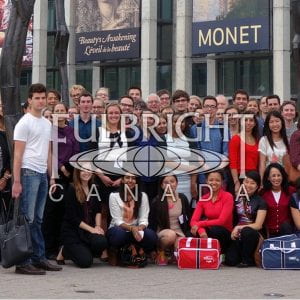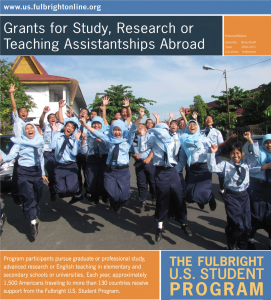Are you interested in applying for a Fulbright US Student Program grant for the 2022-2023 competition?
The below checklist/timeline lists the national application deadline, October 12, 2021, 5 pm ET. Submission by the campus deadline, September 14, 2021, allows Chatham’s fellowship committee to provide applicants with feedback and applicants time to make final edits prior to the national deadline. There are suggested optional tasks to complete and check-ins throughout the summer to help applicants develop and organize required components of the application.
IIE has scheduled many webinars, panels and office hour sessions in the coming weeks and months on a variety of topics related to the Fulbright grants and the application process. Applicants can register for upcoming sessions and view past events here. Please be sure to also review the resources at https://us.fulbrightonline.org/ and particularly the Getting Started tab which can answer many applicant questions.
Suggested tasks / deadlines:
March 31, 2021:
Online application opens. View awards by clicking on specific countries at https://us.fulbrightonline.org/countries or use “Award Search” at https://us.fulbrightonline.org/applicants/
-
-
- Register as applicant in Slate platform; register as a Chatham University applicant
- Check out application and requirements
-
April-May 2021:
-
-
- Thoroughly read Fulbright website and view tutorials at https://us.fulbrightonline.org/about/videos-tutorials . Participate in live webinars and/or view recorded sessions at https://us.fulbrightonline.org/applicants/information-sessions
- Review differences between ETA (English Teaching Assistant) grants and Research/Study grants
- Research your country and Fulbright commission (either grant). Carefully consider the profile of countries. Keep up with current events in the country.
- Research your topic if you are applying for a Research grant; discuss your research topic with your academic advisor and department for ideas and input.
- Begin networking and start looking for affiliations (names and universities) if you are applying for a Research grant. Make initial outreach to university/organization abroad. If you are unsure about how to approach universities, request assistance from your academic advisor, department and/or Fulbright Program Adviser (FPA)
- Work on your language proficiency (register for summer classes and/or self-study)
- Look for opportunities to strengthen your candidacy. Examples: volunteer, academic tutor, language partner for the English Language Program, participate in related research.
- Be in touch with FPA to schedule advising appointments.
-
Summer 2021
-
-
- Update your CV/resume
- Start drafting statements for application
- Fill out your personal details on the application
- If needed, start looking for language reference writers; continue language study
- Think about your recommenders and reach out to them.
- Follow up contact with the university abroad as necessary, secure affiliation letter
- Request university/college transcripts (unofficial is okay) from all schools attended in US and abroad
- Share first drafts of your essays with FPA by July 16 (or earlier)
-
August 16, 2021, Deadline to share revised draft statements with FPA /Fellowship committee for feedback before campus deadline
September 14, 2021, Campus Deadline. You must submit final drafts of your statements at this time and list your recommenders, language, etc.
September 20-24, 2021 Virtual and or on-campus interviews with Fellowship committee. (exact days/times TBD). Campus committee evaluation completed. (FPA uploads form to Slate platform).
Applicants will be able to make additional revisions to application post-interview.
October 12, 2021, 5 pm EST. Online application system closes at 5:00 P.M. EST.
Late January 2022. Semi-finalists announced.
March-June 2022. Fulbright finalists announced by country.
For more information:
Fulbright Program Adviser (FPA) Karin Chipman, kchipman@chatham.edu


